According to a new survey, while caution is still present, corporate risk professionals are leading other organizations in their approach to AI
Jump to ↓
| Finding uses for GenAI in their work |
| Where do corporate risk & fraud professionals go next with GenAI? |
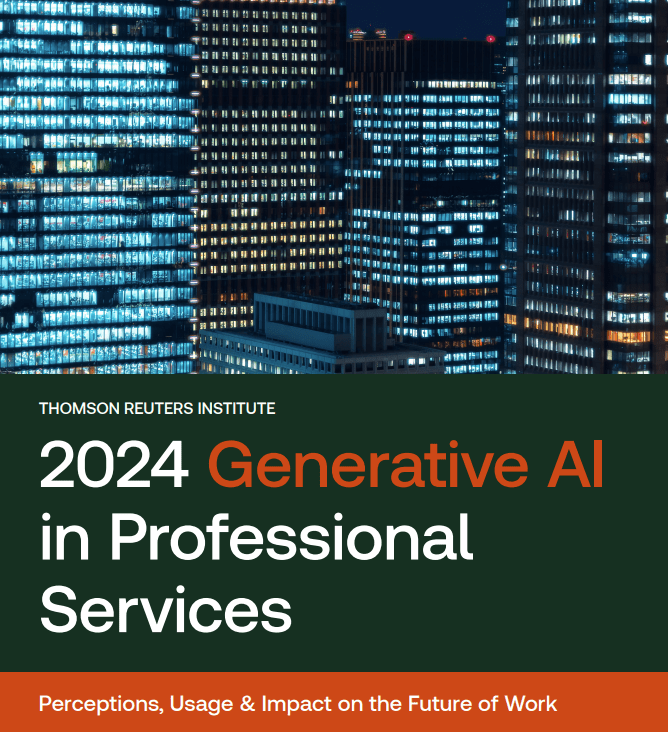 |
Corporate risk and fraud professionals are on the leading edge of organizational adoption of generative artificial intelligence (GenAI) compared to their peers in the private and public sectors, according to the findings of a new survey. Indeed, corporate risk departments are more likely to have already implemented some GenAI tools, and many more say that they plan to do so in the near future. Nonetheless, like their peers, many risk & fraud professionals are proceeding with caution and showing a bit of concern along with their enthusiasm.
Not surprisingly, concerns about GenAI’s well-publicized drawbacks, such as those around inaccuracy or privacy, are what is tamping down this enthusiasm, according to the findings of the Thomson Reuters Institute report, 2024 Generative AI in Professional Services. The report surveyed legal, tax, risk, and government professionals about their feelings about the use of GenAI in their respective industries.
In fact, the most focal sentiment expressed by risk & fraud professionals surveyed was hesitance about the introduction of GenAI into their industry: More than one-third of respondents (35%) said they were hesitant, and 18% said they were concerned or fearful. In general, it’s understandable that risk mitigation has become a top priority for corporations.
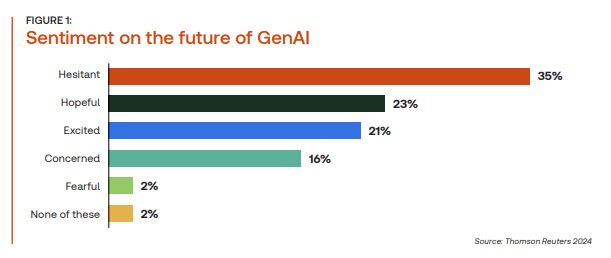
For the industry as a whole, however, even the consideration of GenAI tool adoption is still in its infancy — yet, in many areas, corporate risk & fraud professionals are moving first and faster than other professionals. In the survey, for example, only 23% of all respondents said their organization is actively using or has plans to use GenAI — among risk & fraud professionals alone, it’s 30%. And they are the group most likely to say that they are considering the use of GenAI in the near future (41%, compared to 32% of overall respondents). Indeed, it is very likely that risk & fraud professionals currently are, and will be, the first ones to experience the potential gains and challenges of GenAI use.
Finding uses for GenAI in their work
More than 80% of corporate risk & fraud professionals said that they already could think of use cases for GenAI in their work. Almost half (49%) said they were hopeful or excited about the possibilities opened up by GenAI-powered tools, compared to 44% of all respondents.
Overall, cost reduction and cost savings, as well as increased efficiency, are the top reasons most survey respondents gave for considering GenAI adoption. And at a time when corporate legal, tax, and risk functions are seeking cost reductions and a further streamlining of work processes, GenAI-powered tools are becoming increasingly attractive to achieve those goals.
For risk & fraud professionals, the most often cited potential benefits of using GenAI in their work are around gaining ready access to valuable industry insights and being better able to detect fraud trends — mainly through the use of better GenAI-powered data analytic tools.
On the other hand, some corporate risk & fraud professionals shared their peers’ top concerns about GenAI, around the accuracy and reliability of GenAI work products.
|
Organizationally, risk & fraud professionals tend to be more risk averse; however, regarding the adoption of GenAI tools to aid their day-to-day work, these professionals are at the point of the spear, despite some wariness. Among all survey respondents, more than half (54%) said they believed GenAI should be applied to their work, while just 16% said it should not. Yet, more corporate risk & fraud professionals — almost two-thirds (62%) — said GenAI should be applied to their work.
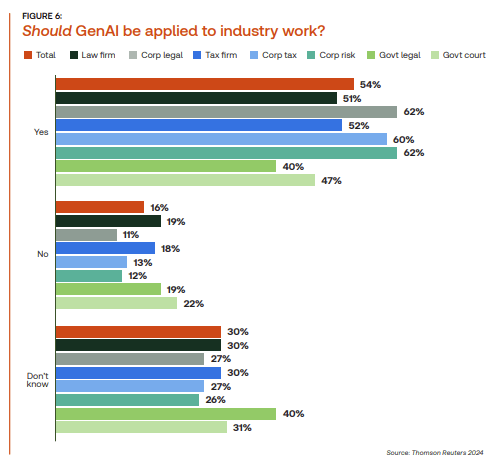
Clearly, and despite hesitancies and concerns that mirrored their peers with the impact of AI on the future of professionals, corporate risk & fraud professionals have still moved faster to incorporate GenAI tools and remain at the forefront of leveraging this innovative technology to improve efficiency and effectiveness and enhance their value to the organization.
Where do corporate risk & fraud professionals go next with GenAI?
So far, corporate risk & fraud professionals are not only ahead of their peers in incorporating GenAI, but also in developing education and training around it. Risk & fraud professionals are nearly twice as likely as other professions in the survey to say they have begun education and training activities surrounding the use of GenAI (38%, compared to just 19% of all respondents).
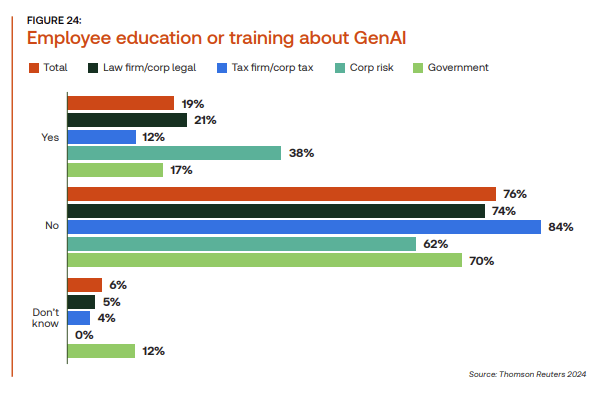
Indeed, part of the reason for this focus on education and training may be to reduce some of the inflated expectations around what GenAI tools can do.
|
However, because corporate risk & fraud specialists will likely be first-past-the-post in routine GenAI use, the perceptions and experiences that these professionals have today are of critical importance, especially when it comes to using AI to manage risks. Indeed, their experiences could well shape the speed and specificity of how organizations approach their own GenAI adoption now and in the near future.
You can download a full copy of the Thomson Reuters Institute survey report, 2024 Generative AI in Professional Services here.
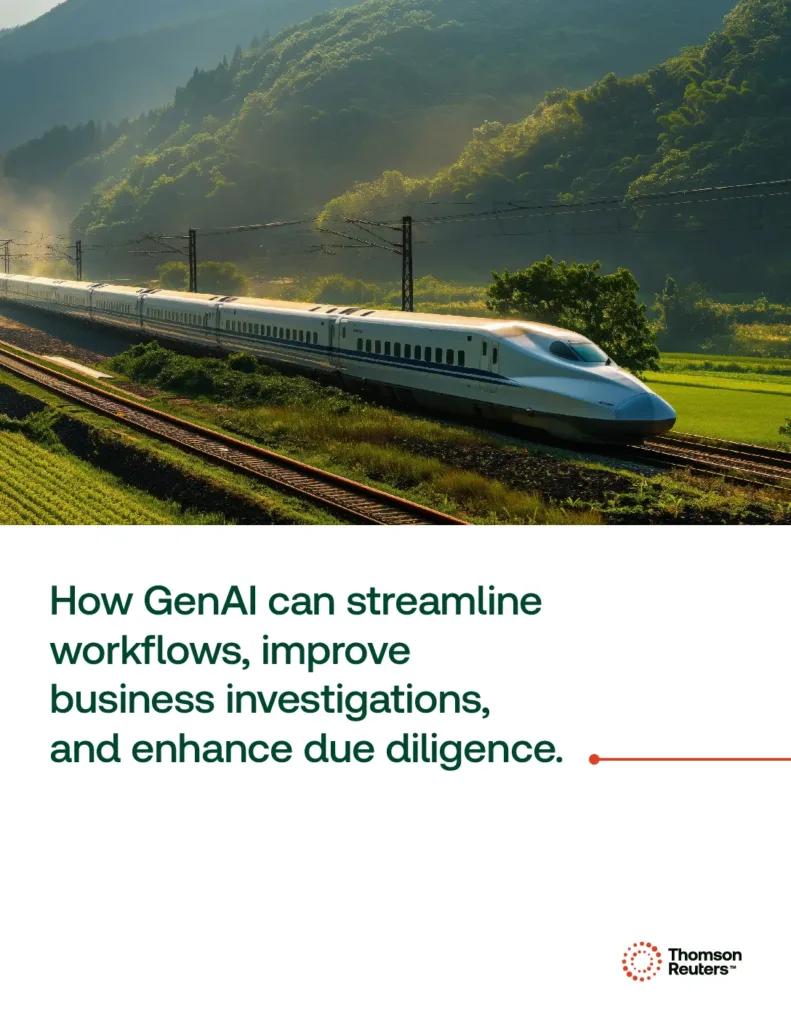 |
Thomson Reuters is not a consumer reporting agency and none of its services or the data contained therein constitute a ‘consumer report’ as such term is defined in the Federal Fair Credit Reporting Act (FCRA), 15 U.S.C. sec. 1681 et seq. The data provided to you may not be used as a factor in consumer debt collection decisioning, establishing a consumer’s eligibility for credit, insurance, employment, government benefits, or housing, or for any other purpose authorized under the FCRA. By accessing one of our services, you agree not to use the service or data for any purpose authorized under the FCRA or in relation to taking an adverse action relating to a consumer application.









